Update: This article has been updated to reflect that there were 100 cases of Covid and one death in Connecticut on Wednesday, not the previous week.
On Thursday the Greenwich Board of Education met in person at Cos Cob school. The five board members and members of the administration who attended in person commented it was a nice change after dialing in remotely since the pandemic closed schools in mid March.
Unfortunately, for Zoomers, there were some difficulties in understanding them through their masks and there were audio issues.
This was the second BOE meeting this week.
The board held an emergency meeting on Monday that focused on Superintendent Dr. Toni Jones’ concern there that staffing shortages would delay the first day of school. (See: Despite Staffing Crunch, Greenwich Schools to Reopen on Time; Covid Testing Possible)
Ultimately, after hiring was ramped up, and the community jumped in to spread the word about jobs and apply for them, school will open on schedule with orientation for kindergarten, grade 6 and grade 9 on the 8th of Sept and the first day for all students on the 9th.
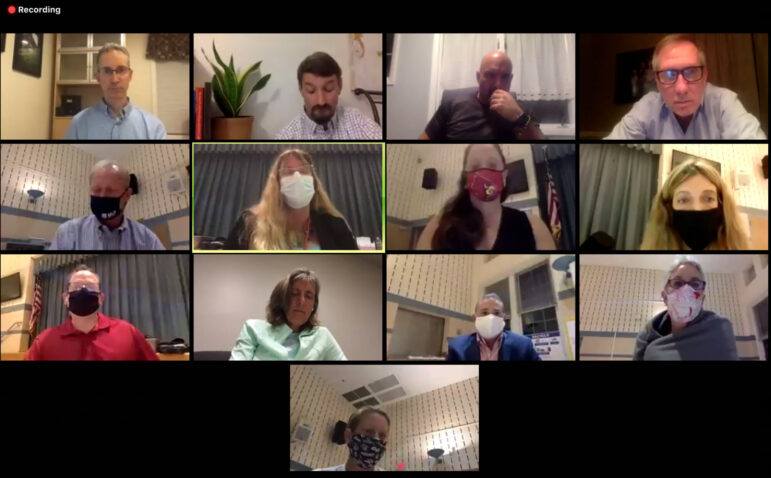
Thursday’s meeting featured a 2-1/2 hour discussion about the middle school music program.
The board said they were taken off guard to learn that band, orchestra and chorus electives had been replaced with a general music program.
Board members all said they would like music electives added back in, noting they are part of the required curriculum.
They noted other districts in Fairfield County had kept band, orchestra and chorus in tact, though Dr. Jones pointed out that those districts adopted hybrid models, and Greenwich has planned a full, in-person K-8 program that 83% of students plan to take advantage of.
The three middle school principals said it was not possible to assure Covid-19 safe protocols of social distancing, organize the students into cohorts and schedule band, orchestra and chorus given the existing complexity of student schedules.
“We had to make some choices,” said Jason Goldstein, principal at Eastern Middle School. “We brainstormed many many different variations and ideas to figure out how could we offer as much as humanly possible, or mathematically possible. We’ve made compromises across the board.”
Tom Healy, principal at Central Middle School, said teacher contracts require them to have five teaching periods in the seven period day, leaving two periods that are non classroom instruction.
Western principal Gordon Beinstein shared photos of the repurposed band room and media center at his school. He said they were forced to make the choices they did, but that he felt strongly that having middle school students return to the building was paramount.
“The kids need to be in our buildings. They need connections with their friends. They need connections with their teachers,” he said.
“You don’t like our schedule. We don’t like our schedule. We didn’t say, ‘Let’s minimize certain content areas. The key piece for us was health and safety for the kids,” Beinstein said.
“If everything is a priority, nothing is a priority,” he continued. “We built everything around what’s safest for the kids. Certain content areas took a hit. It’s not just music. I’ve got a Home Ec teacher with no stove. I’ve got a tech teacher with no bandsaw. I got a gym teacher with no gym because that’s become my cafeteria. The art teacher is just in classrooms drawing because they can’t use clay.”
Mr. Beinstein said band rooms had already been repurposed into classrooms in order to keep class sizes small and space students out.
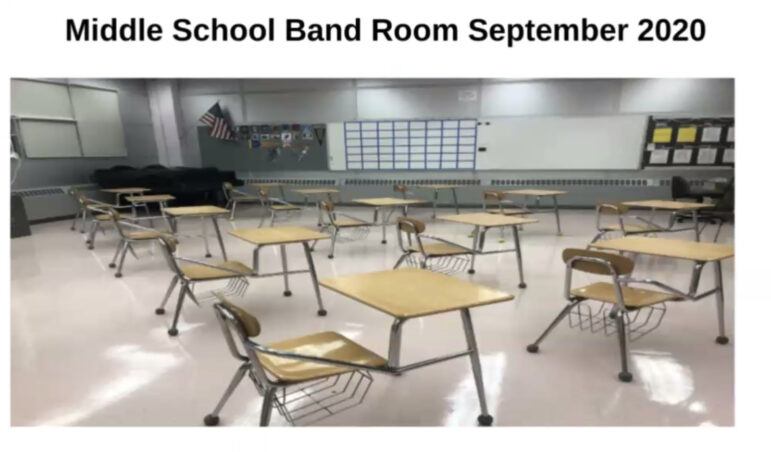
The principals explained middle school students have variables in their schedules that make them complex. They have their choice of Spanish or French. They are placed in one of three levels of math, and there are two levels of English Language Arts – grade level and ALP.
The principals said as an alternative, they would offer a club-type, remote, after school students experience where students could continue to play their instruments.
Karen Kowalski said that option would not suffice. She said students might have to take care of siblings after school, or have another activity or a job. She said it was a “huge injustice” not to provide the electives. “We need a better explanation,” she said.
Several board members pointed out that the music electives are important for social emotional learning.
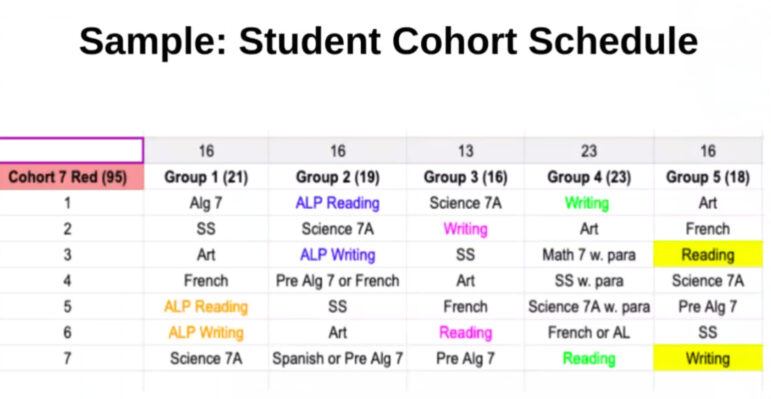
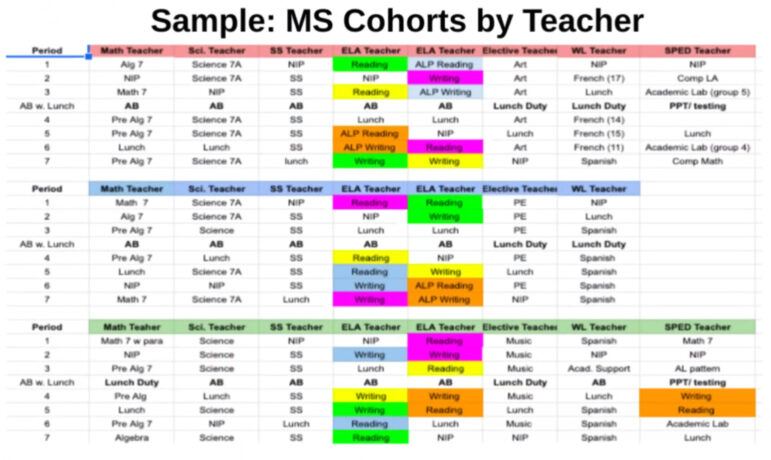
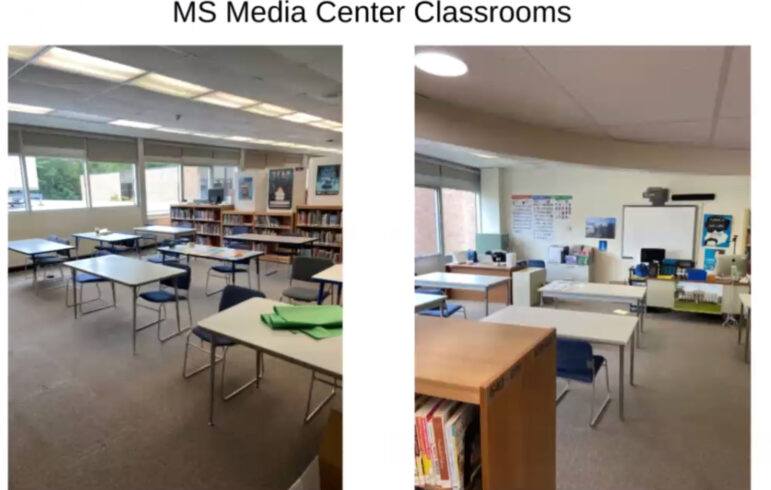
There was friction between some BOE members and the superintendent.
Mr. Sherr asked whether the administration had explored the idea of renting tents. He said private schools were erecting tents for outdoor instruction.
Dr. Jones said that had been explored and determined to be unsafe. “We met with the tent company,” she said. “Especially in the middle of hurricane season, that’s how you end up with a pole going through someone’s window. And you have to rent them for the full year and go through Planning & Zoning.”
Board members said they’d received hundreds of emails from concerned parents.
Board members said the music electives were important for social emotional learning.
Peter Sherr was the most vocal. “With all due respect, I realize this is an irritation to the administration. Don’t worry I’m incredibly irritated with the administration on this entire process, so it’s even-steven,” he said. “Turn off the smoke machine and the excuse factory. We have a problem…here’s the problem. We’re in this position because of decisions that were made. The board wasn’t involved.”
“It’s a governance failure,” he added. “It’s not (the middle school principals) fault.”
“We need to hear from administrators in the music dept any and all creative thinking. Nothing is crazy,” he continued. “We got to this place because someone put in constraints at the beginning.”
Dr. Jones said it would not be possible to add the electives back without switching to a hybrid model or compromising health and safety.
“Under the current constraints – with everyone in the building and cohorts, we can’t do it. We’re at the 11th hour now. School starts in two days. It’s a nonstarter. If you give us a timeline and set of constraints, by Columbus day, we could probably make something happen that looks like the high school schedule.”
– Superintendent Dr. Toni Jones
“I don’t go down easy from a challenge,” she said. “I mean, sincerely, I need to understand if the board is willing to give on social distancing, cohorting and hybrid.”
“I’m unlikely to approve hybriding because it has dramatic ramifications to the rest of the system,” Mr. Sherr said.
BOE chair Peter Bernstein agreed. “If you’re asking would we want to move to hybrid to fit this in, I say no. I do want the music program to end up back in. I’m not interested in losing cohorting, social distancing.”
“I find it fascinating tonight there is nobody on the call from the music department. It’s amazing to me,” Mr. Sherr said.
Karen Kowalski asked principal Beinstein what he would need to bring back band, orchestra and chorus.
Beinstein it would take a lot more staffing, and more class space.
“I think if we’re going to cohort we’ll need three teachers per building to manage general music so our current teachers can go back to their content areas – and it would be a pull-out model. And find rooms that have been repurposed for other functions. That’s three rooms I don’t have. It would require nine teachers.”
Gordon Beinstein, Western Middle School principal
Mr. Sherr said he would have liked the board to have been asked for additional staffing before the administration went ahead and removed the music electives.
“Has anybody asked, ‘Hey board, will you give me the money to go get 9 more teachers?” he said. “Or giving stipends (to music teachers) to teach more and we’ll pay you more.”
Mark D’Amico, director of curriculum for K-8, said the elementary school instrumental teachers typically split their time between buildings, which they didn’t want to do, given Covid. Instead, he said the instrumental teachers would instead back up the general music teachers via livestream.
Mr. Sherr said having extra staff live streaming in to back up music teachers was difficult to reconcile with the need for additional staffing to return band, chorus and orchestra in middle school.
“In one place we don’t have enough and in another place we’re doubled up,” Sherr said. “This curriculum is already set. The superintendent has an obligation to teach it and deliver it.”
“And by the way, generalized music theory means is, ‘Let me teach you how to read sheet music,'” Sherr said. “I don’t think that is acceptable.”
“You need to deliver the curriculum. Until the board changes the curriculum it’s necessary for you to deliver it,” Sherr said. “And I’d like our music educators participating with the middle school administrators.”
“I’m one of the eight board members who says make it happen,” Meghan Olsson said. “The community has spoken.”
“Band, chorus and orchestra must be put back into the curriculum and into the schedule and we have to figure out how to provide assistance,” Ms Kowalski said. “We should at least hear some out of the box thinking from the music dept on the 17th. Let’s start the dialogue sooner rather than later. The key stakeholders are absent tonight. The key stakeholders are the music teachers.”
“We’re trying our best to open on Sept 9. Let’s see what happens,” said Kathleen Stowe. “Every day brings new data. These three principals, this administration and board members have given up their entire summer. No one took vacation, and to imply otherwise is truly disturbing. Let’s get that going, start school Wednesday, and let’s find out how we can get the music program back in a safe way and as reasonable a time as possible.”
The board talked about voting on a sense of the meeting resolution, but in the end simply asked asked Dr. Jones to return at the Sept 17 meeting with creative ideas based on music teacher input.
On WGCH 1490 am Friday morning Peter Bernstein reflected on the meeting. He pointed out that Connecticut’s numbers are favorable, with only 100 cases across the state and one death the previous week.
“Compared to where the rest of the country is, Connecticut is in a unique spot. We’ll keep an eye on it,” he said, noting that the numbers could change at any time.
He said three teachers had tested positive for Covid-19, but that was prior to school starting.
“Will everything be perfect?” he asked. “No, probably not. We just need to be realistic. We’ll hopefully be nimble enough to deal with things as they happen.”
See also:
Despite Staffing Crunch, Greenwich Schools to Reopen on Time; Covid Testing Possible
Boys & Girls Club of Greenwich to Open Daytime High School Remote Learning Center
Greenwich Schools: 82%+ Children to Start the Year in Person
Jones on School Reopening: A serious approach to student social-emotional needs
State Teachers Union Calls For Delayed School Opening Two Weeks